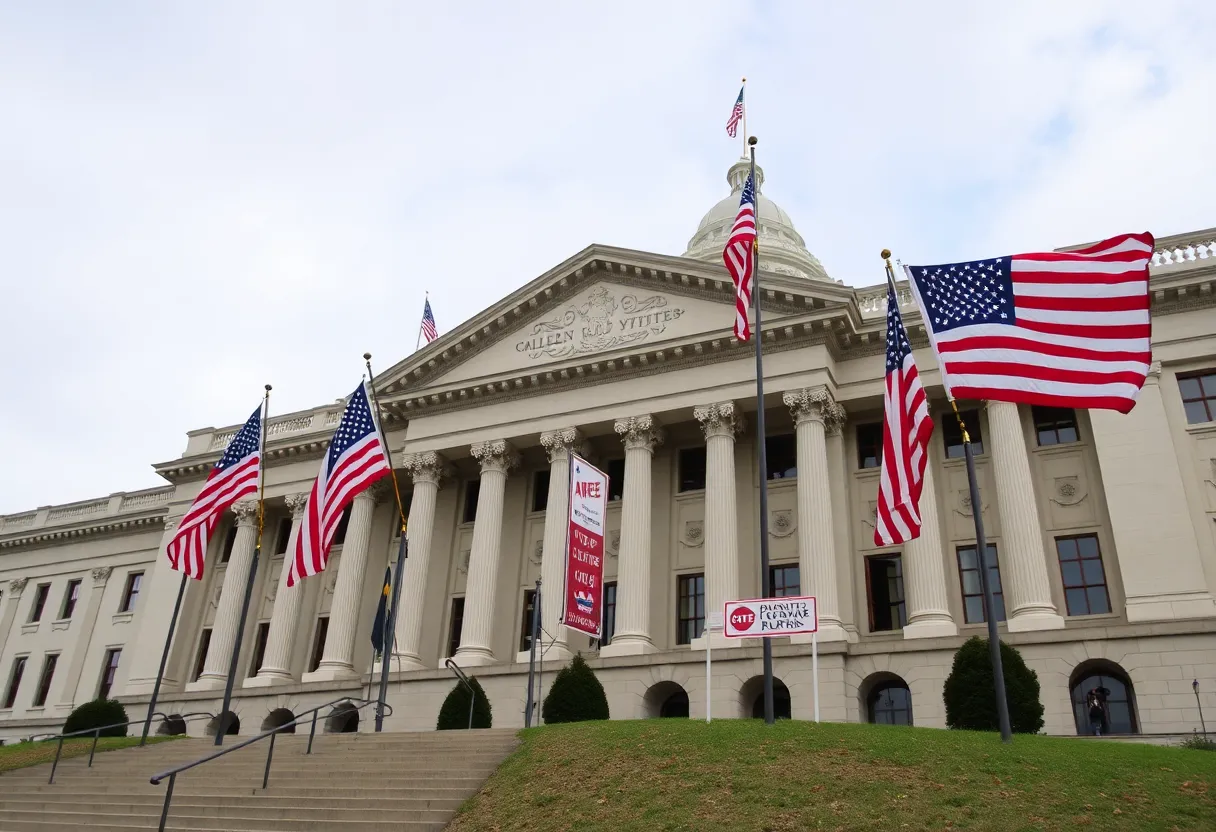

Legislative building with American flags and voting signs.
With the new year approaching, South Carolina is preparing for significant political changes as the state legislature reconvenes on January 14, 2025. Following the November elections, the Republican party has gained a supermajority in both the State House and Senate, setting the stage for a potentially explosive legislative session.
The Republican party, buoyed by recent electoral successes, has established control with 34 of the 46 seats in the State Senate and 88 of the 124 seats in the State House. This supermajority means that Republican lawmakers have the power to pass legislation without the need for any Democratic votes.
As the state prepares for its 126th legislative session, Rep. Bill Taylor of Aiken is advocating for a slate of new measures aimed at reforming government structure and fiscal policies. Key legislative efforts include amendments aimed at controlling federal spending, reforming tax policies, and enhancing public safety measures.
This legislative activity is occurring at the South Carolina Statehouse in Columbia, where lawmakers will gather to outline their agendas and begin debating proposed bills. This session is crucial as the shifting political landscape enables Republicans to push for initiatives that have previously faced significant challenges.
Lawmakers will reconvene on January 14, 2025, marking the beginning of a multi-year session focused on legislative priorities set by the new supermajorities in both chambers of the legislature. With this new political landscape, the 2025 legislative year is expected to be one of the most significant in recent history.
The recent elections have empowered South Carolina Republicans to pursue an agenda focused on economic reform, governmental oversight, and public safety. With majorities in both chambers, the party has indicated that legislative gridlock may be a thing of the past, particularly regarding House bills that have previously stalled in the Senate.
Among the key issues lawmakers intend to address are proposed tax cuts aimed at enhancing competitiveness with neighboring states. Additionally, there is a focus on removing burdensome regulations that may stifle economic growth and addressing rising costs associated with insurance and local business operations.
Among the legislative proposals on the table are efforts to establish a Balanced Budget Amendment to the U.S. Constitution and initiatives to protect against federal overreach in state legislation. Specific legislation has been introduced that would ban central bank digital currencies in the state, ensuring that local economies are not negatively impacted by centralized federal regulations.
Republican leaders, including Speaker Murrell Smith, emphasize the importance of reclaiming state authority and limiting the federal government’s role in state affairs. This goal correlates with a broader national sentiment calling for federal government reform and accountability.
As South Carolina prepares for this pivotal legislative session, all eyes will be on the actions of Republican lawmakers. The coming weeks may clarify what this new supermajority means for the future of the state and its residents. Whether these proposals translate into effective legislation remains to be seen, but the roadmap is laid out for significant political change.
News Summary The University of South Carolina mourns the loss of Nathanial 'Nate' G. Baker,…
News Summary As wildfires continue to burn across North and South Carolina, officials have declared…
News Summary Dr. Edward Simmer's nomination to lead the South Carolina Department of Public Health…
News Summary In a notable legislative move, South Carolina lawmakers have introduced bills aimed at…
News Summary Raleigh, North Carolina has been recognized as the best-performing large city in the…
News Summary Sustain SC warns that South Carolina could face an economic loss of up…